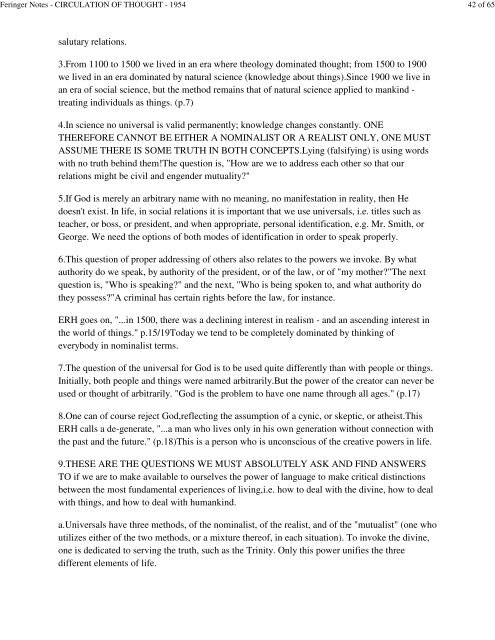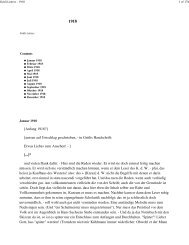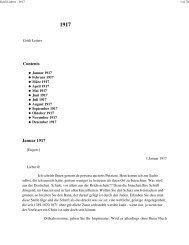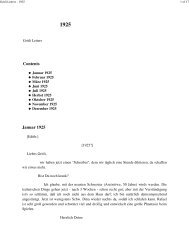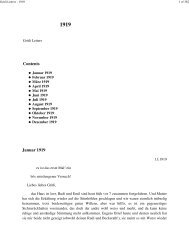Download pdf file - Eugen Rosenstock-Huessy
Download pdf file - Eugen Rosenstock-Huessy
Download pdf file - Eugen Rosenstock-Huessy
Create successful ePaper yourself
Turn your PDF publications into a flip-book with our unique Google optimized e-Paper software.
Feringer Notes - CIRCULATION OF THOUGHT - 1954 42 of 65<br />
salutary relations.<br />
3.From 1100 to 1500 we lived in an era where theology dominated thought; from 1500 to 1900<br />
we lived in an era dominated by natural science (knowledge about things).Since 1900 we live in<br />
an era of social science, but the method remains that of natural science applied to mankind -<br />
treating individuals as things. (p.7)<br />
4.In science no universal is valid permanently; knowledge changes constantly. ONE<br />
THEREFORE CANNOT BE EITHER A NOMINALIST OR A REALIST ONLY, ONE MUST<br />
ASSUME THERE IS SOME TRUTH IN BOTH CONCEPTS.Lying (falsifying) is using words<br />
with no truth behind them!The question is, "How are we to address each other so that our<br />
relations might be civil and engender mutuality?"<br />
5.If God is merely an arbitrary name with no meaning, no manifestation in reality, then He<br />
doesn't exist. In life, in social relations it is important that we use universals, i.e. titles such as<br />
teacher, or boss, or president, and when appropriate, personal identification, e.g. Mr. Smith, or<br />
George. We need the options of both modes of identification in order to speak properly.<br />
6.This question of proper addressing of others also relates to the powers we invoke. By what<br />
authority do we speak, by authority of the president, or of the law, or of "my mother?"The next<br />
question is, "Who is speaking?" and the next, "Who is being spoken to, and what authority do<br />
they possess?"A criminal has certain rights before the law, for instance.<br />
ERH goes on, "...in 1500, there was a declining interest in realism - and an ascending interest in<br />
the world of things." p.15/19Today we tend to be completely dominated by thinking of<br />
everybody in nominalist terms.<br />
7.The question of the universal for God is to be used quite differently than with people or things.<br />
Initially, both people and things were named arbitrarily.But the power of the creator can never be<br />
used or thought of arbitrarily. "God is the problem to have one name through all ages." (p.17)<br />
8.One can of course reject God,reflecting the assumption of a cynic, or skeptic, or atheist.This<br />
ERH calls a de-generate, "...a man who lives only in his own generation without connection with<br />
the past and the future." (p.18)This is a person who is unconscious of the creative powers in life.<br />
9.THESE ARE THE QUESTIONS WE MUST ABSOLUTELY ASK AND FIND ANSWERS<br />
TO if we are to make available to ourselves the power of language to make critical distinctions<br />
between the most fundamental experiences of living,i.e. how to deal with the divine, how to deal<br />
with things, and how to deal with humankind.<br />
a.Universals have three methods, of the nominalist, of the realist, and of the "mutualist" (one who<br />
utilizes either of the two methods, or a mixture thereof, in each situation). To invoke the divine,<br />
one is dedicated to serving the truth, such as the Trinity. Only this power unifies the three<br />
different elements of life.


